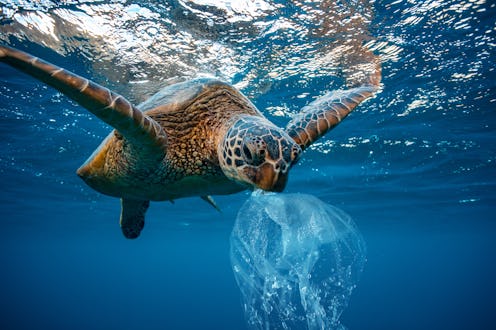Life
Our Oceans Bear The Brunt Of Climate Change — Here's How You Can Help Save Them

A new report published by the United Nations reveals how the world's oceans, which absorb 90% of excess heat trapped by greenhouse gases, are bearing the brunt of climate change. And the impacts go far beyond sea creatures. Compiled by over 100 scientists, the report suggests it could be too late to reverse some of the effects, such as rising sea levels, but that doesn't mean you shouldn't take action. If you want to help save our oceans after reading the UN climate report, it's worth the effort.
The Special Report on the Ocean and Cryosphere in a Changing Climate, published by the United Nations' Intergovernmental Panel on Climate Change (IPCC), is the last of three reports the panel has released since October 2018, and outlines how the ocean is suffering from climate change. Sea levels are rising, water temperatures are getting warmer, and entire ecosystems are sustaining severe damage or crumbling altogether. For example, frequency of marine heat waves has doubled since 1982 and are much longer lasting when they do occur, it says.
Though the report certainly paints a scary future, it also shows how new and aggressive policies in the next few years could directly help the oceans too. "It drives home the message that policies that curb greenhouse gas emissions can have a strong effect on future sea level rise," Andrea Dutton, associate professor in the Department of Geoscience at the University of Wisconsin Madison, said to CNN. "What we do today can decide which of those pathways we're on."
Here are some tips for how you can help to rehabilitate the ocean, based off of the various issues the report laid out:
Rising Sea Levels
According to the UN report, sea levels are rising faster and faster as polar ice melts. They could rise as much as a meter (3.2 feet) by 2100 if global warming surpasses 3 degrees Celsius, according to the report. This would put many cities around the world underwater.
Rising sea levels are a global problem, but there are a few things you can do on a personal level to combat the issue. If you own property, you can plant trees and other greenery in the area, as they help to soak up moisture in the ground. You can also install stepping stones for a patio or paving blocks; if you don't own your property, you can suggest that your parents or landlord do. Per Clean Ocean Action, these are some of the best ways to minimize water runoff, which eventually ends up in the ocean.
Plastic Pollution
The amount of plastic that has made its way to the water isn't just killing sea creatures. It's actually impacting the movement of oxygen to various ocean depths, which in turn makes the water more corrosive for various marine organisms, the report says.
There are a ton of little habit changes you can enforce in your own life to help the ocean Per the Oceanic Society, you can consider doing the following: decrease your use of single-use plastics like coffee cups; make sure you're recycling properly; skip purchasing any products with microbeads; participate in an ocean cleanup, if you live by the beach; and more.
Changing Ecosystems
There are a number of underwater ecosystems that are classified as being at "high risk" of damage due to climate change in the report, including kelp forests and seagrass meadows. Coral reefs are among the most at risk, the report says.
One thing you can do on a personal level to preserve your local ecosystem is to try not to bring foreign plants or pets home and introduce them to your natural environment. Per the Smithsonian Institute, you should also never flush pets like fish down the toilet — they often survive, and can disrupt the natural ecosystem in the area. You can also donate to organizations that are working to stabilize ocean ecosystems like coral reefs.
Fluctuating Fish Population
Global warming has led to a decrease in the overall fish population, the report says, which increases the risk of overfishing certain species.
The best way for you to minimize your impact on the fluctuating fish population is to make sure you're only eating sustainable seafood. That often means eating less of "big fish" like salmon or tuna, and eating more of the seafood that's lower on the food chain (like shrimp), per the World Watch Institute. Seafood Watch, an online site run by the Monterey Bay Aquarium, offers more info about how sustainable any given type of seafood is, and what seafood is best for you to eat based on where you live.
Melting Ice Sheets
The Greenland and Antarctic ice sheets, which are among the largest ice sheets in the world, are predicted to melt at an increasing rate over the course of the next century, per the report.
If you want to do your part, you can consider all of the standard habit changes that help you move towards a more sustainable lifestyle. You can also donate (or subscribe to) to organizations that are focused particularly on researching the melting ice sheets. These include the International Glaciological Society, the Scientific Committee on Antarctic Research, and the World Glacier Monitoring Service.
You can read the Special Report on the Ocean and Cryosphere in a Changing Climate here in full. And if you want to learn more about how you can lead an ocean-friendly lifestyle, you can check out this list of ways to help the ocean by National Geographic.